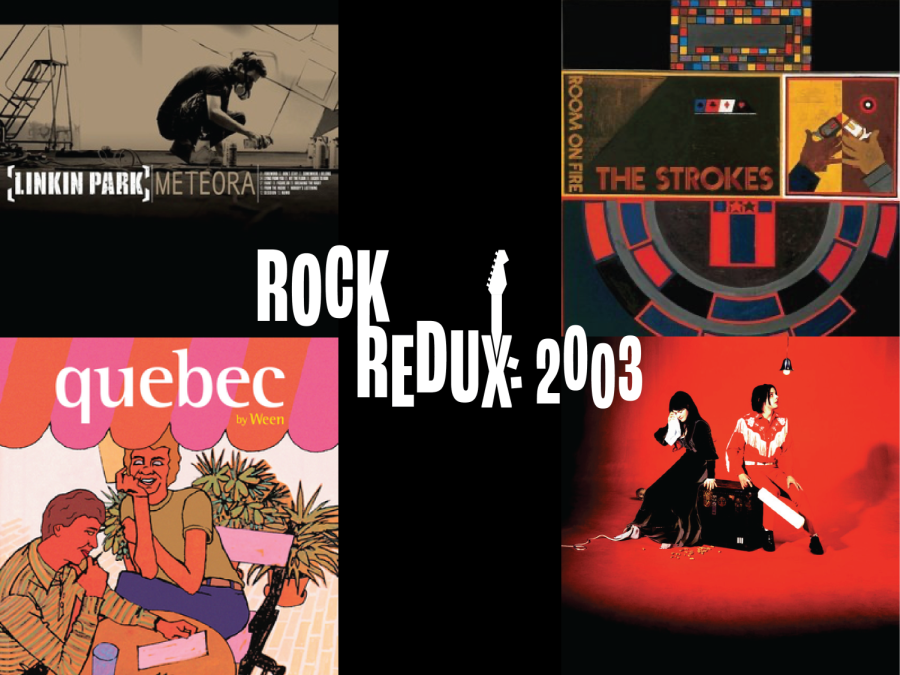Rock redux: the peaks of 2003
With streaming services there’s more music available than ever before. The Sidekick page design editor Josh Campbell goes back to 20 years ago to find four of 2003’s best rock albums.
May 11, 2023
Modern rock isn’t the same as two decades ago, when it was in its prime at the top of the charts. 2003 was a year of historic sophomore albums and great music, but many of my peers haven’t heard of these bands. In Rock Redux, I will be highlighting four of 2003’s best rock albums.
Meteora by Linkin Park
Linkin Park broke into the rock scene in 2000 in a twist on hip-hop/rock fusion with Hybrid Theory. Riding the nu-metal wave of the late 90s into the aughts, it followed with just as much emotional prowess three years later with Meteora. The album is packed full of raw emotions: depression, anger and loneliness personified between Chester Bennington and MC Mike Shinoda.
While only 37 minutes long, Meteora starts authoritatively and keeps a firm grasp on the ears. The sound of glass shattering in the opening track, “Foreword” transitions into “Don’t Stay” in a perfect example of what made Linkin Park distinct in its time. Record scratching, roaring guitars and Bennington’s overpowering vocals evoke a fire of pure emotion over a crumbling relationship.
One of the heaviest riffs comes from “Lying From You,” with shrill vocals from Bennington supported by Shinoda’s rhymes of a dishonest relationship.
I can’t pretend I’m who you want me to be / So I’m (lying my way from) you.
Bennington goes all out with his screaming, supportive vocals that echo alongside Shinoda.
The momentum never ceases except for the slower “Easier to Run,” which still sports a powerful chorus from Bennington and his cast of thundering harmonies.
Rushing back into the nu-metal groove is “Faint,” one of Linkin Park’s most popular songs with its energetic 135 bpm rage and another of Bennington’s most impressive performances with his wailing back-to-back with singing.
“Breaking The Habit” differs from the Hybrid Theory persona. The grating metal guitars are traded for whining strings and elevated by one of Bennington’s most intimate performances, all the while keeping the signature breakbeat drums and occasional record scratch. “Breaking the Habit” is a highlight of the album: Linkin Park leans away from their metal roots, but doesn’t forget them like in later endeavors.
It wouldn’t be right for me to talk about Linkin Park and not mention “Numb.” The mighty chorus rocked the 2000s and shook the music scene when later remixed with JAY-Z’s “Encore.”
It was the ultimate culmination of rock and rap, and the loss of Chester Bennington seven years ago was truly a shame. But Linkin Park’s efforts don’t go unforgotten, with the special release of Meteora 20th anniversary Edition seeing the release of countless unheard demos and live performances, including the rediscovered “Lost,” which feels as if it easily could have squeezed itself in as a 14th cut from the album.
The recovered demo placed Linkin Park back into the Billboard Top 40 back in February for the first time since 2012.
Room on Fire by The Strokes
Garage rock revivalists were quick to continue their success from 2001. After releasing its hit debut Is This It, The Strokes would follow up with more or less the same formula. While vocalist Julian Casablancas gets more rasp in his voice, the dynamic duo of flawless drum and bass from Fabrizio Moretti and Nikolia Fraiture, respectively, and guitarists Nick Valensi and Albert Hammond Jr., trade off outstanding solos throughout the album. The Strokes never seem to come up short of perfection in its sophomore effort Room On Fire.
The best song from the Guitar Hero III: Legends of Rock tracklist, “Reptilia,” opens with a flawless drum and bass before breaking into one of the most renowned Strokes riffs from Hammond. His expert playing drives the frantic pace of the track and, paired with the gritty vocals from Casablancas, fabricates an indie rock staple.
However, I cannot fail to mention Valensi as well. The Strokes stray from dueling guitars and instead finds itself with an irreplaceable duo of complementary guitarists. On the track “12:51,” while Hammond plays a synth-like riff, Valensi strums with a bare-bones rhythm section that does exactly what is needed.
This borrowed blueprint from Is This It drives the album “Automatic Stop” and “Under Control.” Melancholy strumming alongside impeccable drum work creates songs that could never grow old.
The Strokes never ventured further than its perfected credo on Room on Fire, golden rhythm sections, cool-headed delivery from Casablancas and bouncy leads like on “Meet Me in the Bathroom” and “The end has no End.”
He wants it easy; he wants it relaxed / Said, “I can do a lot of things, but I can’t do that.
With textbook garage rock solos, The Strokes were all indie rock would strive to be afterward. The sister albums Is This It and Room On Fire were some of the best they ever had.
Elephant by The White Stripes
On its fourth album, The White Stripes solidified itself as an unequaled duo. Elephant is just as uncanny and in your face as previous projects, but in a refined manner where Jack and Meg White truly can shine.
The opening track turned international stadium chant is a staple in The White Stripes discography, the straightforward yet menacing opening riff of “Seven Nation Army” exploding into a blaring chorus. The track’s power stems from its core simplicity, which could be The White Stripes’ mantra. The duo is the perfect combination: Meg’s crude and so-called “beginner-like” drumming clashes with Jack’s contorted and complex solos: the perfect formula for a timeless rock anthem.
As the feedback echoes away, Jack shoves the listener into “Black Math” with a relentless guitar lick and strained vocals that teeter the track on the brink of insanity, with a wailing solo to push you off the edge.
Writing down things I don’t understand / Well, maybe I’ll put my love on ice
To reel back the lunacy, “I Just Don’t Know What to Do With Myself” slows the tempo, but the energy remains. Plucky chords and a heavy chorus with desperate vocals from Jack keep the album rolling.
While most of The White Stripes discography ends in a rush, “Ball and Biscuit” is a slow-burning, seven-minute raging ballad. What begins as blues evolves over the track into one of Jack White’s perfectly imperfect blaring solos before dipping back into its slower sections to return to another screeching guitar solo.
It only makes sense that The White Stripes’ best song is its longest. Even so, the elephant sized freight train of momentum charges on straight into “The Hardest Button to Button.”
Elephant is full of blues-tinged rock anthems, each with their unique twist, whether it be the punk-esque “Hypnotize” and “Girl, You Have No Faith In Medicine” or the charming acoustics of “It’s True That We Love One Another.” While it’s not White Blood Cells, the album’s strongest songs are the pinnacle of what made The White Stripes so great.
Quebec by Ween
American rock oddity Ween – which, on the off chance you have heard them, was most likely from its inclusion of “Ocean Man” in The Spongebob Squarepants Movie – released its eighth studio album in 2003. Quebec spans from punchy garage rock to psychedelic alternative.
Starting with “It’s gonna be a long night,” Ween doesn’t hold back any punches: it is an in-your-face track that truthfully feels out of place amongst the rest of the spaced-out slower tunes of the album. But that’s not to say that this track doesn’t rock. A nimble riff over shouty vocals makes for a fun but slightly cheesy song.
Leaning back into their more tame alternative sides, “Transdermal Celebration” lets the album settle down with breezy riffs and confounding lyrics.
Transdermal celebration / Jets flew in formation / I could see them / Dropping the crustaceans / Leaving trails of flames in their wake
Ween has a knack for being a bit odd, and that’s only the beginning of Gene and Dean Ween’s antics.
The somber “Tried and True” feels like meditating was transformed into alternative rock. The shifty chord progressions and echoing vocals are haunting yet in a comforting way.
When you think you understand what Ween’s pitching your way, it throws a curveball like the mindless “Hey There Fancypants.” I could almost frolic around town to the bliss of Ween’s nonsensical lyrics.
Hey there fancypants / Play the songs that make us dance / play the tunes that make the ladies swoon
Simply sounds like a good time, no? Just two songs later, Ween hatch up the solemn country tune “Chocolate Town,” strumming away,
Makin’ time breakin’ ground / sail brown bay to chocolate town
Raging highs and comatose lows, “The Argus” meets right in the middle with a psychedelic ballad that trudges into distortion and looping synths. The album closer “If You Could Save Yourself (You’d Save us all)” is one of the album’s most emotional performances with hallowing Pink Floyd-esque chords.
At times Quebec feels as if it is more of a greatest hits compilation spanning a broad discography rather than a cohesive album. Nevertheless, that’s where Ween’s strengths lie. A song to anyone’s liking will be found in their expansive discography.










